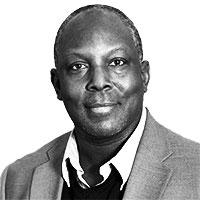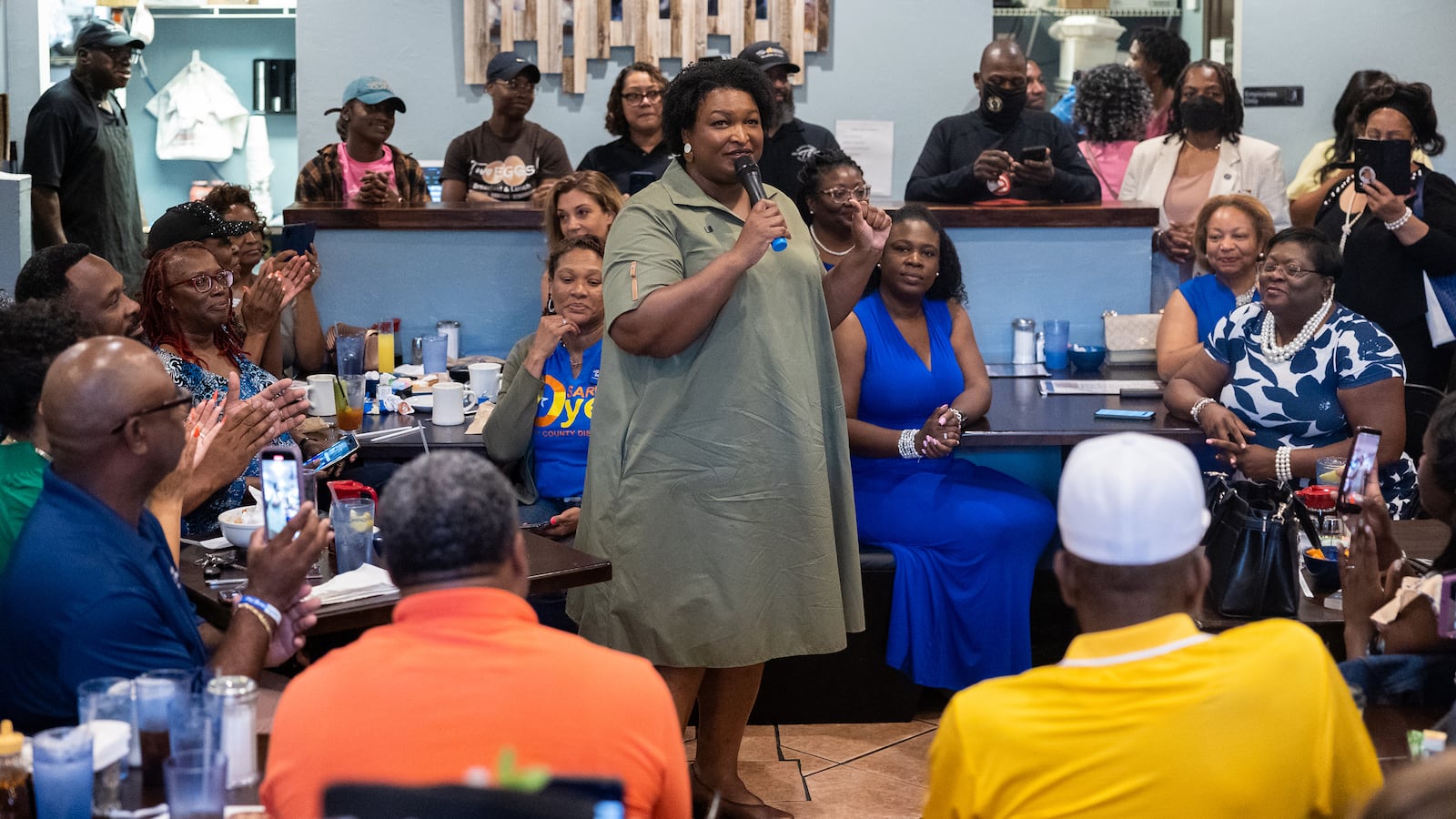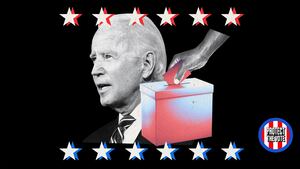Georgia stands a good chance to become the first state governed by a Black-led political coalition. That’s because enthusiasm for the campaigns of Raphael Warnock and Stacey Abrams for senator and governor, respectively, appears to be gaining momentum.
According to a recent Quinnipiac)" href="https://urldefense.com/v3/__https://poll.qu.edu/poll-release?releaseid=3851__;!!LsXw!WsiOubAdQeHELaHngap48-nckJ6QkrDsOzStcjh52_wJmLGjrctwVpliHcAuJaGg5Jo7qv7z7BYfdYPgsK4Rh5fp-hSa4jMdng$">Quinnipiac poll, Warnock’s sprint to re-election had a cash advantage and 10 percentage point lead over Republican challenger Herschel Walker; while Abrams’ rematch with incumbent GOP Gov. Brian Kemp is a dead heat.
If successful, the Georgia midterm election will mark the first time that voters elevated two Black candidates to the highest offices of the state. Furthermore, with Blacks comprising more than a third of the electorate, the emerging coalition can serve as a model for other states.
Yet, the practice of modern statecraft is a new step for Black politicians. And for that reason, it may be instructive to survey the traditions of self-governance in earlier circumstances. The story of Blacks in Georgia, after all, is part of the larger experience of Africans in the Americas.
To start, Black Georgians have the advantage of a deep bench of talented civil servants. For example, Fani Willis, the Fulton County District Attorney conducting a grand jury investigation of the 2020 election, is one of several prosecutors. The number of mayors has increased from 42 to 64 in recent years, according to the Georgia Conference of Black Mayors. Atlanta aside, Black mayors have assumed control of mid-size cities like Augusta and Savannah, and smaller municipalities like Power Springs, Douglasville, and Fayetteville, among others.

Sen. Raphael Warnock.
Tom Williams/CQ-Roll Call, Inc via GettyNow is the time to ask what type of statewide governance do they envision? Will it be used to develop a political class with the skills and outlook to run a state? Does it go beyond mobilizing the people to win the top offices on behalf of the interests of the national Democratic Party? How does it plan to address the needs of the people and perpetuate itself?
Clearly, a sustainable Black-led political organization will require many people with training in the fields of statecraft: public administration, security and lawmaking, economic development and conservation, and guiding the political economy. It requires an understanding of state constitutional precedents and exercise of checks on the legislature and municipalities.
So what lessons can Georgia Democrats learn from the history of pioneer Black states? Let’s briefly examine that history to extrapolate those lessons.
The legacy dates back to the late 16th century “Maroon” colonies of escaped slaves, the term used by the Spanish for animals living in the wild.
One of the best-known maroon states was the Palenque de San Basilio)" href="https://urldefense.com/v3/__https://www.theafricareport.com/28099/in-colombia-a-village-preserves-the-memory-of-its-african-ancestors/__;!!LsXw!WsiOubAdQeHELaHngap48-nckJ6QkrDsOzStcjh52_wJmLGjrctwVpliHcAuJaGg5Jo7qv7z7BYfdYPgsK4Rh5fp-hQxMFcUcw$">Palenque de San Basilio in Colombia. The “Palenque”—a Spanish word for platform—was founded by runaways under the guidance of Benkos Bioho, an African captured in Guinea-Bissau and sold in Cartagena in 1596. (Cartagena was the major slave port for the extraction of precious metals in Colombia, Ecuador, and Peru.)
Around the year 1600, Bioho fled with others and created a defensive fortification in the mountains. The community grew by freeing other captives from the plantations. The “Afro-Colombians” molded an Afrocentric society with a creole language, preserved traditions of religion, folk medicine, music, and ancestor rituals. They formed a social order based on family networks and age groups. To defend against enemies, the Palenque organized a militia and forced Spanish authorities to agree to a peace treaty. In 1603, it became the first self-governing Black state in America.

Newly elected President of Colombia Gustavo Petro and Vice-President Francia Marquez of Pacto Historico coalition celebrate after winning the presidential runoff on June 19 in Bogota, Colombia.
Guillermo Legaria/GettyToday, the descendants celebrate the election of Francia Marquez)" href="https://urldefense.com/v3/__https://www.aljazeera.com/news/2022/3/29/how-francia-marquez-aims-to-break-barriers-in-colombia__;!!LsXw!WsiOubAdQeHELaHngap48-nckJ6QkrDsOzStcjh52_wJmLGjrctwVpliHcAuJaGg5Jo7qv7z7BYfdYPgsK4Rh5fp-hSs0MtyMw$">Francia Marquez, a human rights activist recently elected as the first Black woman vice president of Columbia (who ran with the leftist presidential candidate Gustavo Petro). Afro-Colombians rallied behind an agenda for racial democracy, access to education and medical care, green energy and land reform, and reproduction rights.
Meanwhile, escaped Africans in the Portuguese colony of Brazil created the settlement called “Quilombo,” an African name for a war camp. The Quilombo dos Palmares was a mountain village founded about 1590 when 40 people fled a sugar plantation in the northeast land grant of “Captaincy of Pernambuco.” The haven grew by absorbing runaways, subjugated indigenous Indians, and white indentured servants. The self-governing community of 20,000 was a stark counterweight to the Pernambuco slave colony. It flourished for over 90 years until succumbing to the incursions of Portuguese and Dutch militias.
According to Glenn Alan Cheney, author of Quilombo dos Palmares)" href="https://urldefense.com/v3/__https://www.brazzil.com/palmares-brazils-slave-rebellion-still-going-on-400-years-later/__;!!LsXw!WsiOubAdQeHELaHngap48-nckJ6QkrDsOzStcjh52_wJmLGjrctwVpliHcAuJaGg5Jo7qv7z7BYfdYPgsK4Rh5fp-hRDVeX_oQ$">Quilombo dos Palmares: Brazil’s Lost Nation of Fugitive Slaves, the state “had a quasi-parliamentary government, a complex defense system, a standard of living higher than that of most Europeans on the coast, and an egalitarian society that respected women and all races.”

Monument to Zumbi dos Palmares, the Afro-Brazilian resistance leader of the Quilombo dos Palmares slaves uprising killed in battle in 1695.
Yasuyoshi Chiba/AFP via GettyBetween 1729 and 1740, maroons in Jamaica founded Nanny Town)" href="https://urldefense.com/v3/__https://www.blackpast.org/global-african-history/queen-nanny-maroons-1733/__;!!LsXw!WsiOubAdQeHELaHngap48-nckJ6QkrDsOzStcjh52_wJmLGjrctwVpliHcAuJaGg5Jo7qv7z7BYfdYPgsK4Rh5fp-hTPZo-oVg$">Nanny Town in the Blue Mountains. It was named after an “Obeah” priestess who escaped slavery with her brothers and established a farming refuge in the hills. Nanny Town fought the British and negotiated a truce. It continues to hold sway as a symbol of nation building. She is recognized as a National Hero and her image adorns the $500 note.
Folk spiritualists directed the uprising in the French slave colony of current day Haiti as well. In 1791, Vodou priests Dutty Bookman and Cecile Fatima led a maroon uprising that eventually forged an independent state. By 1804, Haitian fighters had defeated the army of Napoleon Bonaparte and established the only Black republic in the Americas, and the second after the United States.
Haiti’s early foreign policy was focused on human rights—to support the abolition of slavery across the Americas—and its economic policy on fair trade for agricultural products, as chronicled by Jacob Carruthers in The Irritated Genie)" href="https://urldefense.com/v3/__https://www.goodreads.com/book/show/3906921-the-irritated-genie__;!!LsXw!WsiOubAdQeHELaHngap48-nckJ6QkrDsOzStcjh52_wJmLGjrctwVpliHcAuJaGg5Jo7qv7z7BYfdYPgsK4Rh5fp-hS49Pbfnw$">The Irritated Genie: An Essay on the Haitian Revolution.
Meanwhile, in post-Civil War America, former slaves established towns that required a measure of statecraft. One was Mound Bayou)" href="https://urldefense.com/v3/__https://www.blackpast.org/african-american-history/mound-bayou-1887/__;!!LsXw!WsiOubAdQeHELaHngap48-nckJ6QkrDsOzStcjh52_wJmLGjrctwVpliHcAuJaGg5Jo7qv7z7BYfdYPgsK4Rh5fp-hQYbrXqgA$">Mound Bayou, a township in the Yazoo River delta of Northwest Mississippi. It was founded in 1887 when twelve pioneers bought land from a railroad company. Between 1890 and 1915, they governed a hub of 8,000 residents with a post office, six churches, banks, stores, schools, and a critical rail line to Vicksburg and Memphis. Leaders touted an agenda of race pride, self-help, and commercial development—and the town was regarded as an upstanding community.
Mound Bayou went into decline during the urban migrations but the notion of self-governed Black spaces emerged in cities like Chicago. There, South Side leaders had the mindset to develop early structures of community administration: social service agencies, churches, fraternal orders, civil servants, independent media, trade unions, small businesses, and political districts. Democratic Rep. Harold Washington)" href="https://urldefense.com/v3/__https://history.house.gov/People/Detail/23428__;!!LsXw!WsiOubAdQeHELaHngap48-nckJ6QkrDsOzStcjh52_wJmLGjrctwVpliHcAuJaGg5Jo7qv7z7BYfdYPgsK4Rh5fp-hSDVwlf_Q$">Harold Washington was the person to make Black Chicago aware of its inherent power of governance and the experience may be the most relevant to Georgia Dems.
In the 1970s, Rep. Washington described the community as a “sleeping giant” and predicted that if “the potential Black vote ever woke up, we’d control the city.” In 1982, he ran for mayor and was propelled to victory by a Black-led political coalition, saying, “It’s our turn. We’re not going to apologize for it and we’re not going to waste a lot of time explaining it. It’s our turn—that’s all.”

Supporters, including Reverend Jesse Jackson, congratulate Harold Washington after his nomination by the Democratic Party for the office of mayor of Chicago.
Bettmann/GettyAs mayor, Washington’s agenda focused on accountable governance in light of the entrenched opposition of the Board of Alderman. For instance, he established an Ethics Committee, issued a Freedom of Information policy, and opened the city's budgeting process to the public.
Returning to the midterm elections, the early vision of self-governance may provide inspiration for the Democratic quest in Georgia?
First, they would be wise to prioritize accountable and effective governance. This means developing a pipeline of talent from the broader political class.
Second, they should consider the initiation of cultural programs that instill concepts of self-help and race pride; also a religiosity of jubilation and deliverance. The state’s history of maroon activity and reparations certainly merits promotion? After the Civil War, Union Gen. William Tecumseh Sherman issued Field Order No. 15)" href="https://urldefense.com/v3/__https://www.georgiaencyclopedia.org/articles/history-archaeology/shermans-field-order-no-15__;!!LsXw!WsiOubAdQeHELaHngap48-nckJ6QkrDsOzStcjh52_wJmLGjrctwVpliHcAuJaGg5Jo7qv7z7BYfdYPgsK4Rh5fp-hQ7mgABsA$">Field Order No. 15 to distribute the eastern third of the state to former slaves. The policy of restitution was withdrawn before it could take root.
Third, they should make a priority of Black wealth creation—especially workforce development initiatives for the skilled occupations in the growth industries: health care, construction, transportation, real estate, finance, energy production, and entertainment, among others, that generated $540 billion in state economic activity in 2019, according to IBIS World)" href="https://urldefense.com/v3/__https://www.ibisworld.com/united-states/economic-profiles/georgia/__;!!LsXw!WsiOubAdQeHELaHngap48-nckJ6QkrDsOzStcjh52_wJmLGjrctwVpliHcAuJaGg5Jo7qv7z7BYfdYPgsK4Rh5fp-hRKWDPxuA$">IBIS World.
The initiative should include the recruitment of the Black middle class in declining cities of the Midwest and Northeast. It could tout the state as a destination for retirees with financial assets, remote workers, skilled tradesmen, professionals, and university students, and for self-employed and Black-owned businesses.
Finally, they should find ways to promote the reinvigoration of the Black family.
Central is investments in young men debilitated by generations of systemic discrimination. While everyone in the race has suffered the outrages of subjugation, the poor prospects for young men today are glaring. The family, after all, is the launching pad for a community and state.
Black self-governance has looked for ways to rebuild the family for 450 years and it would be sound for Democrats to continue the work.








